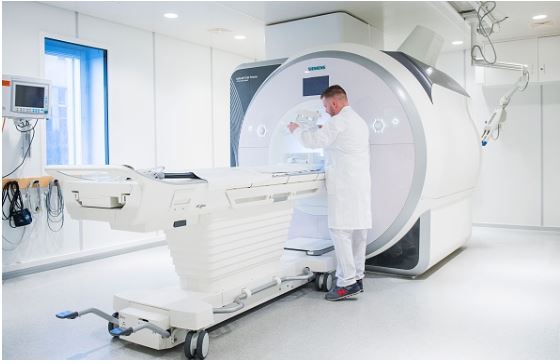
(Credit: Getty Images)
Melanie Vandyke wasn’t exactly eager to have brain surgery.
“I was very nervous, afraid it might make things worse,” Vandyke says of the relatively new procedure that was being recommended to her by epilepsy specialists at Wake Forest Baptist Medical Center.
Even though the operation had the potential to relieve the seizures she had been experiencing for nearly 15 years by eradicating a lesion on her right medial temporal lobe, Vandyke said she was “ready to not have it.”
But discussions with her neurologist, Dr. Cormac O’Donovan, and other members of the team at Wake Forest Baptist’s Comprehensive Epilepsy Center eventually convinced Vandyke that “they were really dedicated to helping me, not setting me back,” so she agreed to the procedure.
That was almost four years ago. She has been seizure-free ever since.
The operation Vandyke underwent is called MRI-guided laser ablation surgery. It is a minimally invasive procedure that is proving to be a very effective treatment for people with medial temporal lobe epilepsy (MTLE), a common form of drug-resistant epilepsy.
“It’s a game-changer,” says Dr. Gautam “Vinnie” Popli, chief of the section on epilepsy at Wake Forest Baptist. “This type of surgery allows us to precisely target areas of seizure without added risk, and there’s a very short recovery time.”
Approximately three million people in the United States have epilepsy, a neurological disease in which abnormal electrical discharges in the brain produce sudden episodes of altered or diminished consciousness, involuntary movements or convulsions. Collectively known as seizures, these episodes can severely limit an individual’s range of activities and lead to a number of serious physical and cognitive problems.
In roughly 60 percent of all cases, epileptic seizures can be controlled by medication. For other patients, especially those identified through brain imaging and other tests as having MTLE, surgery is generally the sole treatment option.
Until rather recently that meant a craniotomy — a conventional, day-long operation involving removing part of the patient’s skull, cutting through healthy brain matter and physically taking out the problem tissue, followed by a weeklong hospital stay and a prolonged recovery period.
The MRI-guided laser ablation method is far less invasive and time-consuming. A thin laser-tipped applicator inserted through a tiny hole in the skull delivers heat to the target area in the brain and destroys the unwanted tissue with the neurosurgeon viewing and being guided by real-time MRI images throughout the operation.
The entire process can be completed in about four hours, the incision in the scalp can be closed with just one stitch and most patients can go home the next day and resume their normal activities without restrictions.
“The patient is not excessively inconvenienced or placed at extraordinary risk to get relief from their seizures,” Popli says. “There’s much less collateral damage and fewer adverse effects than conventional surgery, and better outcomes.”
Neurosurgeons performed the first MRI-guided laser ablation surgery for epilepsy at Wake Forest Baptist in 2012, using a technology called Visualase. Since then they have employed the system more than 45 times on patients ranging in age from under 18 months to over 60 years. The success rate of these operations, in terms of either eliminating seizures or reducing their frequency or severity, depending on the individual patient’s condition, has been above 75 percent.
Popli called that a marked improvement over the 60 percent success rate of conventional epilepsy surgery, which, he noted, has not been performed at the medical center since it adopted the Visualase technology.
Melanie Vandyke was among the first dozen people to undergo laser epilepsy surgery at Wake Forest Baptist, and although she was discharged from the hospital the following day it took much longer than that for her to regard the operation as a success.
“It was probably five or six months after the surgery before I felt that it really had helped me,” says the 40-year-old resident of Buchanan County in southwestern Virginia. “Now I know that it was definitely worth it.”
These days Vandyke is working full-time, driving, traveling, socializing and doing just about everything else the epileptic seizures had kept her from doing for most of her adult life.
“When I was having the seizures I was a different person than I was before. I was isolated, and felt as if I was a burden on everyone, especially my parents,” Vandyke says. “But now I’ve regained my independence. I’m back to being the old me, and thankful for that.”




